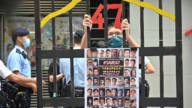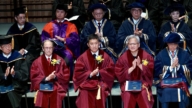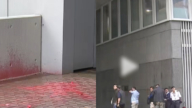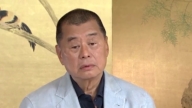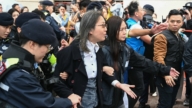【新唐人2011年6月2日訊】連日來的內蒙古抗議,民眾與當局的對峙仍然在持續。中共調集軍隊武警,採取封校封網封鎖消息等嚴厲措施後,首次表態,宣稱對“合理的要求”給予回應,並指摘這一事件背後有“境外人士”在煽動。內蒙古當局宣稱,展開為期一個月的煤礦檢查,試圖平息牧民被煤礦人員開車撞死引起的憤怒。有媒體認為,中共使用軟硬兼施的手段想平息這場抗議,但是否真的有效呢?請看報導。
內蒙古呼和浩特5月30號發生千人示威抗議後,當地氣氛仍緊張。香港《蘋果日報》6月1號報導說,傳當地將持續封校半個月,憤怒的學生將學校的牆推倒表示抗議。
香港《東方日報》則報導說,社交網站twitter 31號流傳一份題為《關於封校原因的說明(提綱)》的文件,指「5.30集會」是由境外敵對勢力和境內少數極端分子組織、計劃、煽動的一個政治陰謀,並聲稱封校的目地是要孤立壞人,打擊敵對分子,要求學生們要與黨中央和自治區黨委保持一致。
另據《博訊網》消息,當地民眾反映,31號,街上的士兵看起來少了一些,但其實都躲在軍用大卡車內,而這些軍車則躲在了附近的政府單位裡。
有關內蒙古的真實信息在中國互聯網上受到嚴密封鎖,但中共官方卻首度對內蒙古的抗議事件進行了回應。
據《路透社》5月31號從北京發出的報導說,中共外交部發言人姜瑜在例行記者會上說,一些人在海外試圖利用“那一事件製造麻煩,抱有不可告人的目地”。
《美國之音》的報導認為,中國官員指責外國人和當地製造事端的人煽動抗議活動,已經是慣例。
6月1號,當地最高級別蒙古族官員,內蒙古自治區主席巴特爾在中共黨刊《求是》上發表文章承認,如何解決好民生問題是重大的政治問題,並承認,內蒙古存在經濟發展不平衡問題。
內蒙古自治區是中國最大的煤產區,和稀土儲藏最豐富的地區。過去蒙古族人佔多數,現在蒙古族只佔內蒙古全部人口的20℅。
多年來,很多內蒙的作家和知識份子曾經呼籲當局重視內蒙生態環境問題,但是從來沒有引起上面重視,一些異議作家還被當局逮捕並被判以重刑。最大的例子就是內蒙古作家哈達被判刑事件。
在內蒙古拍攝許多環境照片的中國獨立攝影師盧廣,曾以《中國的污染》專題獲得國際大獎。他表示,內蒙古的環境已經被破壞到讓人“慘不忍睹”的程度。
盧廣:“比如說有些地區整個煤帶,一個是50公里。整個煤帶的50公里當中全部全面的開發,無序的開採導致了整個環境嚴重的破壞。很多內蒙有煤礦的地方,幾乎環境破壞的是根本沒辦法看的一個場景。”
目前流亡德國的「保衛內蒙古人權同盟」組織主席席海明表示,蒙古人已經被逼到了走頭無路的境地。
席海明:“達賴喇嘛說共產黨對少數民族進行的(是)文化上的種族滅絕。我們蒙古是遊牧民族、草原民族。你把我草原破壞了,把草原剝奪了,我放牛、放羊放不成了,你整個是在挖我的根兒呢,刨我的祖墳呢。”
中共當局目前似乎表示了要平息這場抗議的決心。儘管內蒙古在民族問題方面一向比較平靜,不像西藏、新疆那樣矛盾尖銳,但蒙古人壓抑已久的怒火,中共有辦法平息嗎?
日本《每日新聞》31號發表駐北京記者成澤健一的報導認為,中共當局一方面竭力阻止內蒙古連續出現的抗議行動的擴散,同時也作出姿態,表示要改善當地居民的生活,力圖以軟硬兼施的手段平息局面。
中共的這種招數是否奏效呢?是否能讓蒙古人不生氣呢?
曾在內蒙古插隊十年的中國青年報《冰點》週刊前主編李大同在接受BBC中文網的採訪時說,最多只能達到表面上的平息。只要有風吹草動,還是隨時會爆發出來,並且爆發的規模可能更大。
席海明:“我覺得這個事情並不是你壓死了一個人,該賠多少錢? 該賠一千萬,一萬萬,這對我們來說不感興趣。我們感興趣的是我們蒙古草原、我們蒙古人的命運。”
席海明強調, 如果這個問題解決好了,蒙古人就不生氣了。
新唐人記者 李靜 孫寧 綜合報導
Quiet Mongols’ Explosive Anger
Protests in Inner Mongolia continue.
Facing the explosive anger of the quiet Mongols,
the Chinese Communist Party (CCP) agrees
for the first time to address some demands,
but says protests are incited by overseas elements.
How effective is the CCP’s response?
On May 30, a protest in Hohhot of Inner Mongolia
involved a thousand people. Hong Kong-based
Apple Daily reported that schools are closed and
angry students tore down school walls in protest.
Oriental Daily reported on the schools’ closing
in an official document circulated on Twitter.
The document accuses people from overseas
and “extremists” for the May 30 protest.
The document says schools are closed
to isolate the bad people and oppositionists,
and it asks students to take the side of the CCP.
Boxun News reported that on May 31,
fewer soldiers were seen on the street,
and most soldiers stayed in military trucks
that are hidden inside government compounds.
Information on the protest is censored in China.
Authorities have responded to the protest.
Reuters reported from Beijing that Jiang Yu,
CCP’s Foreign Affairs spokesperson,
accused at a press meeting “outsiders of trying
to play up this incident due to ulterior motives.”
Voice of America radio said it is common
for the CCP to blame foreign elements for protests.
Bateer, a Mongolian governor in Inner Mongolia,
said in an article on June 1, that improving
people’s lives is a political question.
He admits problems of economic imbalance.
Inner Mongolia has the largest coal production,
and richest store of rare earth metals in China.
The Mongolian population used to be more,
but now only makes up 20% of the population.
In recent years Mongolian scholars have been
calling for Inner Mongolia’s ecological protection.
Some dissident writers have been arrested
and sentenced, such as Mongolian writer Hada.
Independent photographer Lu Guang’s photos
of the environment of Inner Mongolia
received international awards.
He said that the environment in Inner Mongolia
has been destroyed miserably.
Lu Guang: “Some coal mines have 50km strips,
all opened for coal mining. Disorderly mining
destroyed the land. Many coal mining areas
are so damaged, one can’t bear the sight.”
Xi Haiming, in exile in Germany and president
of Inner Mongolia Human Rights Alliance,
said Mongols are forced into a dead end road.
Xi: “Dalai Lama said CCP’s policy on minorities
is cultural elimination.
Mongols are nomads on the grassland.
You destroyed our grassland
and I cannot raise cattle and sheep. You dug out
our roots and destroyed our ancestors’ tombs.”
CCP wants to placate Mongols’ protests
as they have been quieter than Tibet and Xinjiang,
but Mongols cannot suppress their anger now.
Japan’s Daily News reported that Chinese regime
tries to control the protest with gesturing to better
people’s lives, using both soft and hard methods.
Can the communist party pacify Mongols’ anger?
Li Datong, editor of China Youth, who lived
in Inner Mongolia for 10 years, said to BBC
that superficial peace is all you can expect.
Once wind stirs up again, anger will come out,
even more explosive than before.
Xi Haiming: “This isn’t about one person killed
and how much money is needed to compensate.
This is not our focus. We are concerned about
our Mongolian grassland, Mongols’ fate.”
Xi said if this concern is addressed,
Mongols’ anger will dissipate.
NTD reporters Li Jing and Sun Ning


